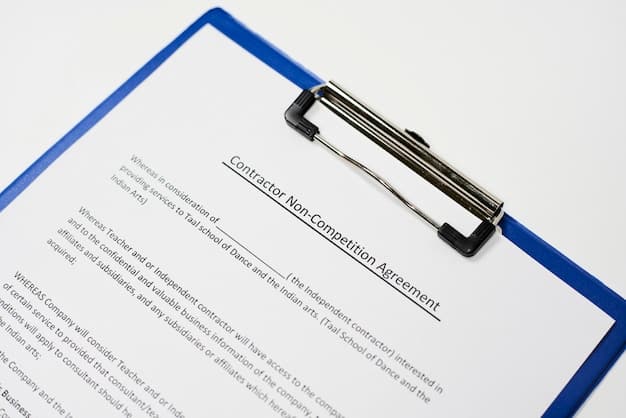Gig Worker Rights: Your Legal Protections in the US

Gig worker rights in the US encompass various legal protections, including but not limited to minimum wage, anti-discrimination laws, and workplace safety regulations, though their applicability can vary based on worker classification and state laws.
Are you a gig worker navigating the complexities of your employment status? Understanding your gig worker rights and legal protections in the US is vital to ensure fair treatment and safeguard your interests. This article will shed light on the legal landscape for gig workers, exploring key protections and resources available.
What Defines a Gig Worker?
The gig economy is booming, but what exactly constitutes a gig worker? Understanding this definition is crucial because it impacts the legal rights and protections you are entitled to.
Defining the Gig Economy
The gig economy is characterized by short-term contracts, freelance work, and temporary positions. Workers are typically classified as independent contractors rather than employees.
This classification has significant implications for benefits, taxes, and legal protections. As a gig worker, recognizing your status within this framework is the first step in understanding your rights.
- Typical roles in the gig economy include delivery drivers, freelance writers, and virtual assistants.
- Gig workers often have a flexible schedule, allowing them to work on their own terms.
- The downside is that they usually lack the benefits that traditional employees receive.

In essence, a gig worker is part of a labor market that relies heavily on temporary and project-based work. This necessitates a clear understanding of your position and the laws that protect you.
Understanding Employee vs. Independent Contractor Classification
One of the most significant challenges in the gig economy is the distinction between an employee and an independent contractor. This classification directly impacts your eligibility for various rights and protections.
Misclassification Issues
Many companies misclassify workers as independent contractors to avoid paying benefits and taxes. This practice can deprive workers of essential rights guaranteed to employees.
If you believe you have been misclassified, it’s important to understand the criteria used to determine your proper status.
- Control over how work is performed is a key factor in determining employee status.
- Providing tools and materials often indicates an employer-employee relationship.
- The duration of the working relationship also matters; long-term relationships lean towards employee status.
Being aware of these distinctions empowers you to challenge misclassification and claim the rights you deserve.
Wage and Hour Laws: Are They Applicable?
Wage and hour laws are designed to ensure fair pay and working conditions. However, their applicability to gig workers is often a complex issue, depending on their classification and specific circumstances.
Federal and State Minimum Wage Laws
Understanding whether you are entitled to minimum wage and overtime pay is crucial. Federal and state laws often provide these protections to employees, but not necessarily to independent contractors.
For example, if you’re classified as an employee, the Fair Labor Standards Act (FLSA) mandates minimum wage and overtime pay. However, independent contractors are generally exempt.
Knowing your state’s specific wage laws and how they apply to gig workers is essential. Some states have taken steps to extend these protections, but it varies significantly.

Navigating these wage and hour laws requires careful consideration of your employment status and the relevant regulations in your jurisdiction.
Discrimination and Harassment Protections for Gig Workers
Even though gig workers are often classified as independent contractors, they are still entitled to protection against discrimination and harassment.
Federal and State Anti-Discrimination Laws
Title VII of the Civil Rights Act prohibits discrimination based on race, color, religion, sex, and national origin. While traditionally applied to employees, some courts have extended these protections to independent contractors.
Many states also have their own anti-discrimination laws that cover a broader range of protected classes. For instance, some states include sexual orientation and gender identity.
Understanding these laws and how they apply to your specific situation is vital in ensuring a fair and respectful work environment.
Workplace Safety and Health Regulations
Ensuring a safe working environment is a right that should extend to all workers, including those in the gig economy. However, the application of workplace safety and health regulations to gig workers can be complicated.
OSHA and Gig Workers
The Occupational Safety and Health Administration (OSHA) sets standards to protect employees from workplace hazards. But the applicability of OSHA to gig workers depends on their classification.
Companies that exercise significant control over a gig worker’s work environment may be considered employers and therefore subject to OSHA regulations. This is especially relevant in industries like delivery services.
Staying informed about your rights under OSHA and state-level safety regulations can help you advocate for a safer working environment.
Access to Benefits: Healthcare, Retirement, and Paid Leave
One of the major drawbacks of gig work is the lack of traditional benefits such as healthcare, retirement plans, and paid leave. This leaves many gig workers financially vulnerable.
State and Federal Initiatives
Some states are exploring ways to provide gig workers with access to benefits. For example, California’s Proposition 22 aimed to classify gig workers while providing some limited benefits.
Federal initiatives, such as portable benefits programs, are also being discussed as potential solutions. These programs would allow workers to carry their benefits from job to job.
Keeping an eye on these developments can help you stay informed about potential opportunities to access much-needed benefits.
| Key Point | Brief Description |
|---|---|
| ⚖️ Employee vs. Contractor | Understanding your classification affects your rights to benefits and wages. |
| 💰 Wage and Hour Laws | Minimum wage and overtime protections may not apply to independent contractors. |
| 🛡️ Anti-Discrimination Laws | Protections against discrimination and harassment still apply in gig work. |
| 🏥 Access to Benefits | Limited access to healthcare, retirement, and paid leave is a significant challenge. |
Frequently Asked Questions (FAQ)
What rights do gig workers have?
Gig workers have rights that vary based on their classification as either employees or independent contractors; these rights can include protection against discrimination, and in some cases, minimum wage and overtime.
Are gig workers entitled to unemployment benefits?
Eligibility for unemployment benefits depends on state laws and how the gig worker is classified. Generally, employees are eligible, while independent contractors may not be unless they meet specific criteria.
What can a gig worker do if they are misclassified?
If a gig worker believes they are misclassified, they can file a complaint with the Department of Labor or pursue legal action to be recognized as an employee and receive associated benefits.
How does OSHA apply to gig workers?
OSHA standards may apply if the company exerts significant control over the gig worker’s work environment, effectively making them an employee under OSHA guidelines.
What are portable benefits for gig workers?
Portable benefits are designed to move with the worker, from job to job, and can include health insurance, retirement savings, and paid time off, aimed at providing more security for gig workers.
Conclusion
Understanding your rights as a gig worker is crucial for navigating the complexities of the modern workforce. By staying informed and advocating for fair treatment, you can protect your interests and contribute to a more equitable gig economy.





